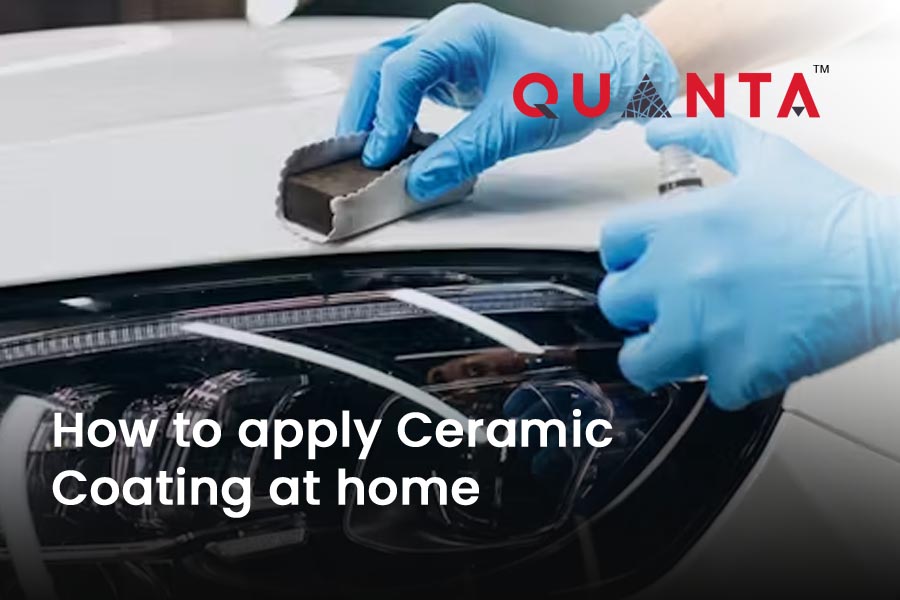How to Apply Ceramic Coating at Home – DIY Guide for Lasting Shine & Protection
Ceramic coating at
home has revolutionized how car enthusiasts protect their vehicles without
spending a fortune at detailing studios. With DIY ceramic coating, you
can achieve showroom-like shine, water-repellent protection, and improved
durability—all from the comfort of your garage.
This guide shows how
to do ceramic coating at home with step-by-step instructions, tips on how
to buy ceramic coating, and a comparison of PPF vs Ceramic Coating.
You'll also learn how to combine ceramic coating and PPF for
maximum paint protection.
1. What Is Ceramic Coating and Why Do You Need It?
Ceramic coating is a
liquid polymer that chemically bonds with your car’s paint, forming a durable,
glossy layer. Unlike traditional waxes, the best quality ceramic coating
provides long-term protection that can last up to two years or more.
Key Benefits:
- Hydrophobic Surface: Dirt, mud, and water bead up and slide
off easily.
- UV & Chemical Resistance: Shields against sun damage, acid rain, and bird droppings.
- Enhanced Gloss: Deep, mirror-like shine and color
enhancement.
- Scratch Resistance: Guards against swirl marks and minor
scratches.
With this ceramic
coating at home guide, you can enjoy all these benefits at a fraction of
the professional cost.
2. How to Buy Ceramic Coating: Choosing the Right Kit
Before you start, it's
important to know how to buy ceramic coating that fits your needs.
Considerations:
- Durability: Look for kits that offer at least 12–24 months
of protection.
- Ease of Use: Choose beginner-friendly kits that
include applicators and prep sprays.
- Hydrophobic Performance: Strong water-beading is a good indicator
of quality.
- Kit Contents: Ensure the kit has:
- Coating bottle (5–30 ml)
- Applicator block and suede cloth
- Surface prep spray or IPA wipes
- Microfiber towels
Best Brand for Ceramic Coating in India:
Top choices include Gyeon
Q², CarPro CQuartz, Turtle Wax Hybrid Solutions, and newer
players like Quanta offering the best quality ceramic coating products
with bundled kits.
3. Preparing Your Car: Essential Surface Prep
Proper prep is
non-negotiable in any DIY ceramic coating process.
Prep Steps:
- Thorough Wash with pH-neutral shampoo.
- Iron Remover to eliminate brake dust and rail
particles.
- Clay Bar Treatment to remove embedded dirt.
- Paint Correction to polish out swirls (optional but
recommended).
- Final Wipe-Down with alcohol spray for perfect bonding.
4. How to Do Ceramic Coating at Home: Easy Application Steps
Step 1: Controlled
Workspace
- Shaded, dust-free area at 10–30°C.
- No direct sunlight or moisture exposure.
Step 2: Application
- Shake the bottle.
- Apply 2–3 drops on the applicator.
- Work in 2x2 ft sections using a crosshatch
motion.
Step 3: Buffing
- Wait 30–60 seconds for flashing.
- Use a microfiber towel to gently buff.
- Polish to streak-free finish.
Step 4:
Panel-by-Panel Process
- Repeat application and buffing on each
section.
- Slight overlaps are fine, but avoid drying
delays.
Step 5: Curing
- Let cure 1–2 hours indoors.
- No water or dust exposure during initial
cure.
Step 6: Optional
Layers
- Apply a second coat after 1–2 hours.
- Max 2–3 layers for best effect.
5. Post-Coating Care & Maintenance
To get the most from
your ceramic coating at home, follow these steps:
- No wash for 7 days post-application.
- Use pH-neutral shampoo every 2–4 weeks.
- Dry using a microfiber or an air blower.
- Apply ceramic booster sprays every 2–3
months.
- Avoid acidic or abrasive cleaners.
6. PPF vs Ceramic Coating – Which One’s Better?
- PPF (Paint Protection Film) offers superior impact resistance and is
self-healing.
- Ceramic Coating excels in gloss, ease of cleaning, and
chemical resistance.
- Want the best of both? Ceramic coating
and PPF together provide unbeatable protection.
For new cars, apply PPF
first, then ceramic coating on top to preserve the film and enhance
hydrophobicity.
7. Common Mistakes to Avoid
- High Spots: Buff within the flash time.
- Streaking: Use minimal drops and smaller sections.
- Flaking/Peeling: Inadequate surface prep.




